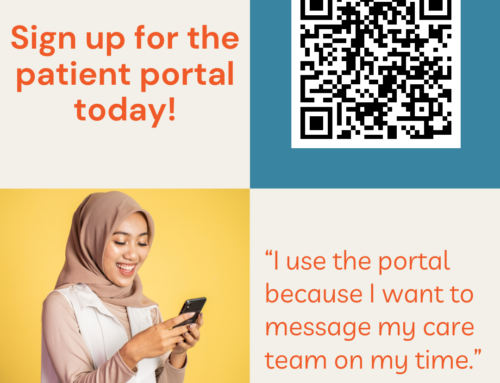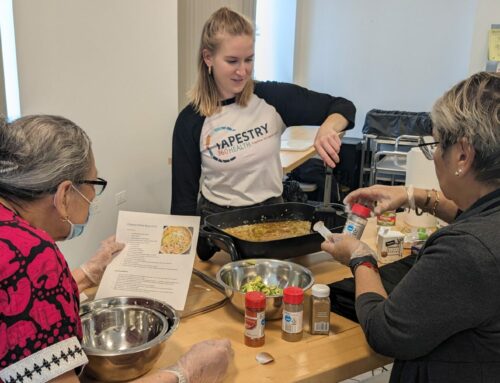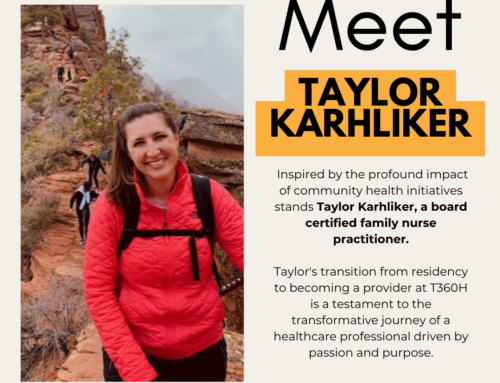News
Family Planning Q & A with Advocate Illinois Masonic Nurse Midwives

Tapestry 360 Health partners with the Advocate Illinois Medical Center Nurse Midwifery Service – the oldest nurse midwife program in the state of Illinois – to provide birth & pregnancy, well woman and family planning care. In November 2020 we spoke with Certified Nurse Midwives Alison Conte and Karen Wennerberg to learn more about the services they provide to our patients.
Q. Tell us a bit about the Advocate Midwife Service?
A. Our midwifery group has been at Advocate Illinois Medical Center for over 45 years.
Some patients who have their babies with us were delivered by an Advocate midwife, and some midwives are caring for the babies of women they delivered.
We’ve been seeing patients at 845 W. Wilson Ave. since it was part of the Chicago Department of Public Health, and we partnered with Tapestry 360 Health to provide women’s health care when it became the Tapestry Wilson clinic.
We love seeing patients at Tapestry 360 Health. We get to meet so many women from different countries and backgrounds. All of the FQHCs are special for being able to give extra access to patients who sometimes get brushed aside or who were unaware they could get this care.
Q. What services do Advocate midwives provide at Tapestry 360 Health?
A. We provide Obstetrics and Gynecology care — well-woman services, birth control and family planning, and pregnancy care.
We have 40 minutes to an hour to see new patients, for our returning patients it’s normally 20 minutes, but if somebody has additional needs, we can spend more time if we need to.
Women who are cared for during their pregnancy by a midwife, often report that they are able to create a deep, personal connection with their midwife. Midwives have the opportunity to have more time with our patients, which means we discuss more than just medical care. We have the time to talk about how their pregnancy fits into their lives.
For family planning and birth control, we talk to women about all their options to help them decide which is best and we do procedures such as insert IUDs and implants.
We also see women who may have Urinary Tract Infections, UTIs, or discharges, women who have irregularities in their cycle or pelvic pain, and for mammograms. We don’t do mammograms but for women without insurance Tapestry 360 Health has a program through Swedish Hospital to get mammograms free or at low cost.
We are able to give all of this care to women at a price that they can afford, on a sliding scale. At Tapestry Wilson, the Illinois Family Planning Program can make it very affordable or even free for some patients to get the care they need.
Q. How do you advise women making decisions about their birth control on their choices?
A. We do a lot of education on side effects and help determine what treatment/methods might be a fit for somebody.
If they decide to start the pill or an injection, we can start that day, or we can have them come back for another appointment.
People ask ‘What’s the best option, do you think?’ But it really is all about choices. There’s so many options you can tailor for each individual.
We talk about the hierarchy of effectiveness of birth control a lot, especially when we are talking to teenagers.
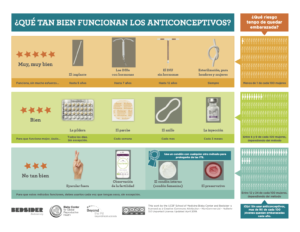 |
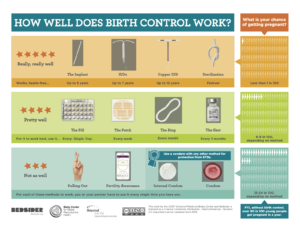 |
Your least effective method of birth control is not using anything. Then, at the start of the hierarchy of effectiveness we talk about methods that include withdrawal, condoms, and birth control pills that you have to take every day (which works well in combination with other methods). Further up the hierarchy are vaginal ring, injections every 3 months, as well as long-acting reversible contraceptives such as IUDs and nexplanon–those last two are among the most effective.
The Illinois Family Planning Program, which is a state-funded resource available to our patients at Tapestry Wilson, is a wonderful program. Whether someone has insurance or not, we are able to help meet their family planning needs.
Q. How has it been providing services during COVID 19?
A. We instituted new protocols, like for cleaning rooms between visits. Everyone created great guidelines quickly for safe visits. It’s just adjusting to try and keep things safe.
We do initial consults via Telehealth, but we’ve been seeing patients in person throughout the pandemic. You have to be able to put your hands on the pregnant woman’s baby and listen to heart tones, and patients still have to come to the clinic for a procedure or to pick up their pills.
In the beginning, pregnant women were scared and we didn’t have a lot to tell them because there were limited studies. Now we have more research that is telling us that Covid is not spread from a pregnant woman to her unborn baby. Pregnant women still need to be careful, like everyone else, but now we have this reassuring information that we can share with our patients.
Tapestry 360 Health partners with the Advocate Illinois Medical Center Nurse Midwifery Service – the oldest nurse midwife program in the state of Illinois – to provide birth & pregnancy, well woman and family planning care. In November 2020 we spoke with Certified Nurse Midwives Alison Conte and Karen Wennerberg to learn more about the services they provide to our patients.
Q. Tell us a bit about the Advocate Midwife Service?
A. Our midwifery group has been at Advocate Illinois Medical Center for over 45 years.
Some patients who have their babies with us were delivered by an Advocate midwife, and some midwives are caring for the babies of women they delivered.
We’ve been seeing patients at 845 W. Wilson Ave. since it was part of the Chicago Department of Public Health, and we partnered with Tapestry 360 Health to provide women’s health care when it became the Tapestry Wilson clinic.
We love seeing patients at Tapestry 360 Health. We get to meet so many women from different countries and backgrounds. All of the FQHCs are special for being able to give extra access to patients who sometimes get brushed aside or who were unaware they could get this care.
Q. What services do Advocate midwives provide at Tapestry 360 Health?
A. We provide Obstetrics and Gynecology care — well-woman services, birth control and family planning, and pregnancy care.
We have 40 minutes to an hour to see new patients, for our returning patients it’s normally 20 minutes, but if somebody has additional needs, we can spend more time if we need to.
Women who are cared for during their pregnancy by a midwife, often report that they are able to create a deep, personal connection with their midwife. Midwives have the opportunity to have more time with our patients, which means we discuss more than just medical care. We have the time to talk about how their pregnancy fits into their lives.
For family planning and birth control, we talk to women about all their options to help them decide which is best and we do procedures such as insert IUDs and implants.
We also see women who may have Urinary Tract Infections, UTIs, or discharges, women who have irregularities in their cycle or pelvic pain, and for mammograms. We don’t do mammograms but for women without insurance Tapestry 360 Health has a program through Swedish Hospital to get mammograms free or at low cost.
We are able to give all of this care to women at a price that they can afford, on a sliding scale. At Tapestry Wilson, the Illinois Family Planning Program can make it very affordable or even free for some patients to get the care they need.
Q. How do you advise women making decisions about their birth control on their choices?
A. We do a lot of education on side effects and help determine what treatment/methods might be a fit for somebody.
If they decide to start the pill or an injection, we can start that day, or we can have them come back for another appointment.
People ask ‘What’s the best option, do you think?’ But it really is all about choices. There’s so many options you can tailor for each individual.
We talk about the hierarchy of effectiveness of birth control a lot, especially when we are talking to teenagers.
 |
 |
Your least effective method of birth control is not using anything. Then, at the start of the hierarchy of effectiveness we talk about methods that include withdrawal, condoms, and birth control pills that you have to take every day (which works well in combination with other methods). Further up the hierarchy are vaginal ring, injections every 3 months, as well as long-acting reversible contraceptives such as IUDs and nexplanon–those last two are among the most effective.
The Illinois Family Planning Program, which is a state-funded resource available to our patients at Tapestry Wilson, is a wonderful program. Whether someone has insurance or not, we are able to help meet their family planning needs.
Q. How has it been providing services during COVID 19?
A. We instituted new protocols, like for cleaning rooms between visits. Everyone created great guidelines quickly for safe visits. It’s just adjusting to try and keep things safe.
We do initial consults via Telehealth, but we’ve been seeing patients in person throughout the pandemic. You have to be able to put your hands on the pregnant woman’s baby and listen to heart tones, and patients still have to come to the clinic for a procedure or to pick up their pills.
In the beginning, pregnant women were scared and we didn’t have a lot to tell them because there were limited studies. Now we have more research that is telling us that Covid is not spread from a pregnant woman to her unborn baby. Pregnant women still need to be careful, like everyone else, but now we have this reassuring information that we can share with our patients.





